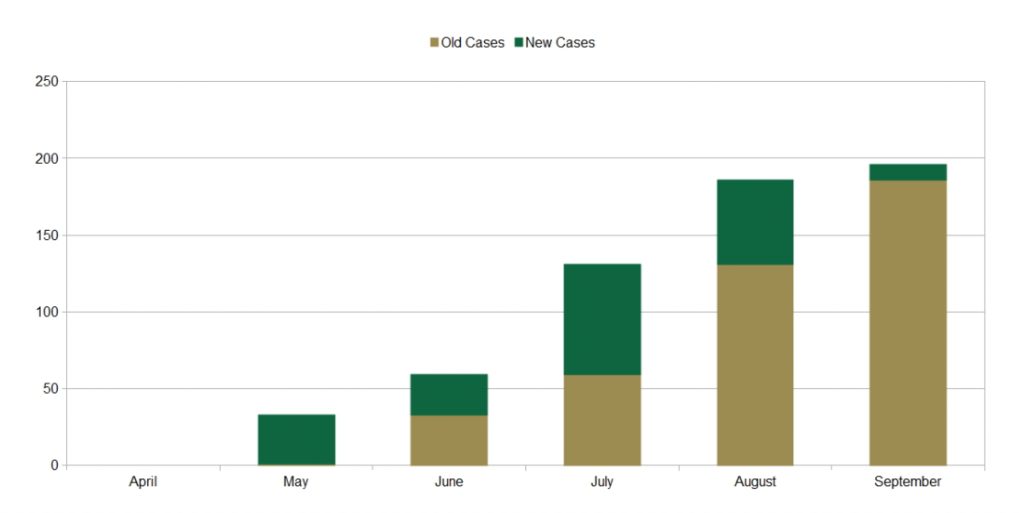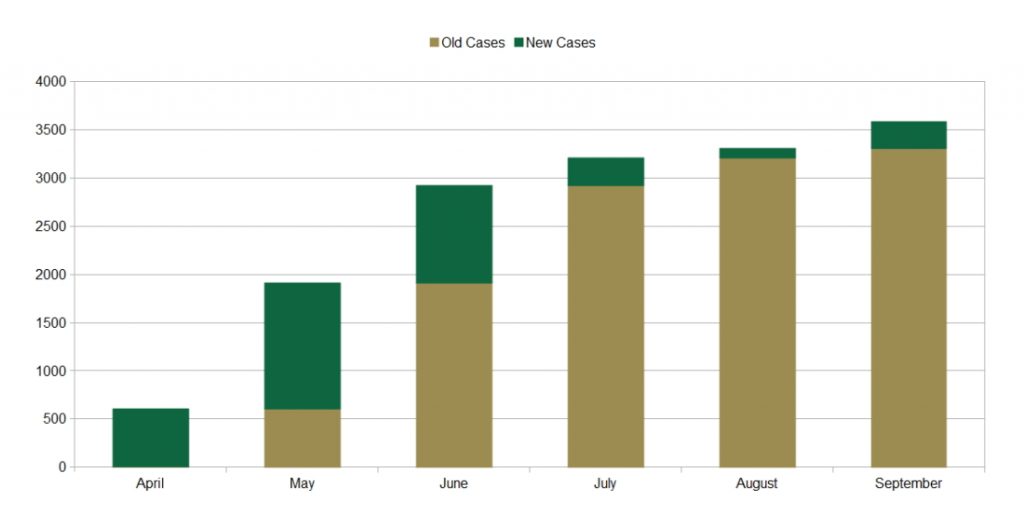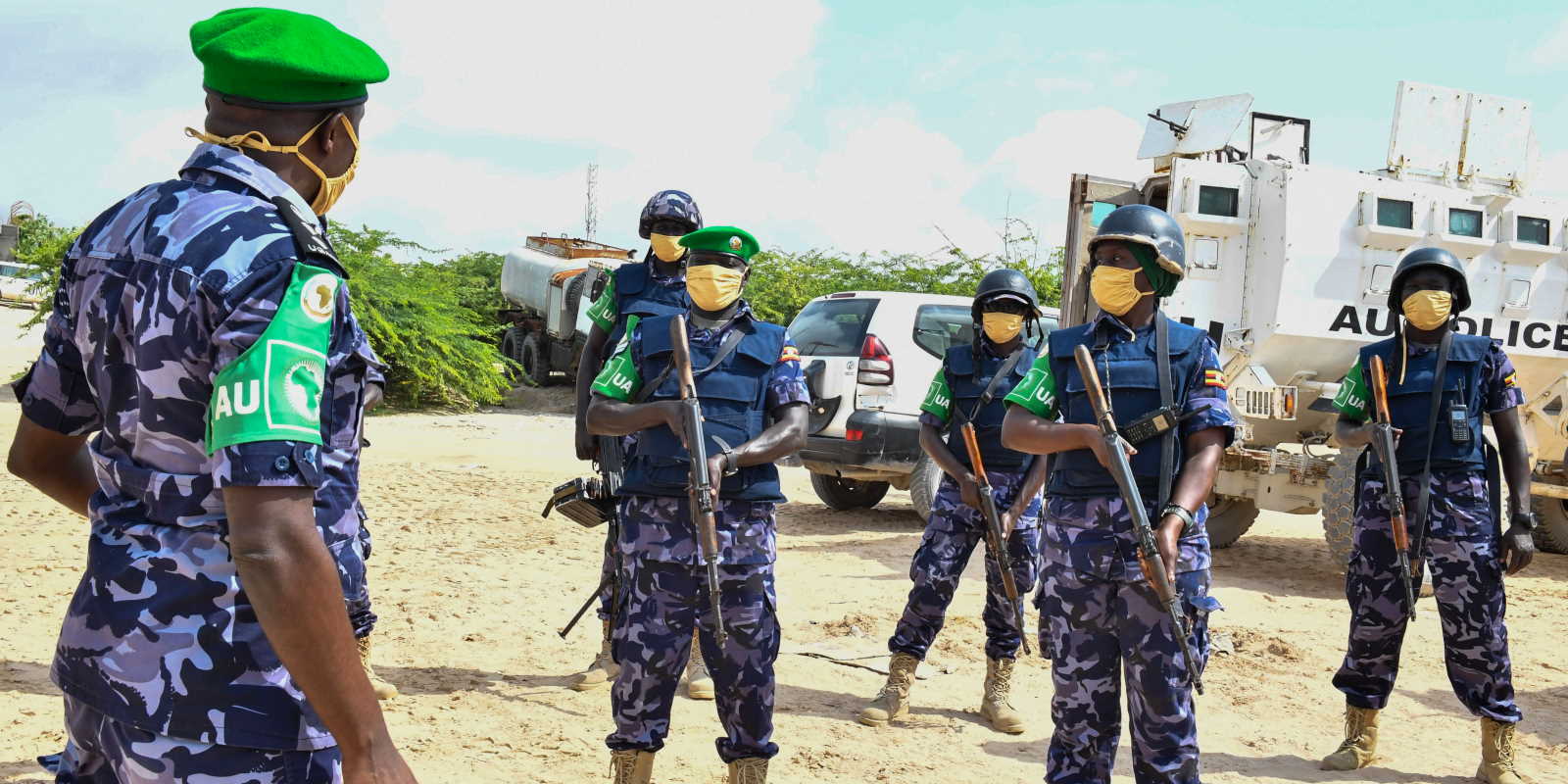Instituting of the AMISOM COVID-19 Committee
Apart from implementing African Union Commission (AUC), the Africa Centres for Disease Control and Prevention (Africa-CDC), World Health Organization (WHO) and Federal Government of Somalia (FGS) COVID-19 instructions, directives and guidelines, one of the first actions AMISOM took to mitigate the spread of the pandemic in the mission was to establish a multidimensional COVID-19 committee, comprising various subcommittees within the military, police and civilian components, to guide the mission on how to deal with the pandemic.
AMISOM has managed to adapt and find ways of discharging its mandate, despite the #COVID-19 pandemic @AmbFMadeira @amisomsomalia
Tweet
The first recorded case in the Aden Abdallah International Airport (AAIA) camp – the base camp around the airport in Mogadishu that accommodates all AMISOM components, together with all the United Nations (UN) Missions in Somalia, UN Guard Unit and sundry other partners – was in April. There was a subsequent surge in the following months. This peaked in July, after which a downward trajectory of active cases commenced, as depicted in Figure 1:
Figure 1: Cumulative total AMISOM recorded cases

The first recorded case in Somalia outside the AAIA camp was recorded in March, with 3 confirmed cases. By April, there were 598 new cases, surging to 1 315 cases in June, after which a downward trend was witnessed, as depicted in Figure 2:
Figure 2: Recorded cases in Somalia according to Ministry of Health reports

Prior to the escalation of COVID-19 in Somalia, the mission was discharging its mandated tasks in line with its concept of operations (CONOPs) and the Somalia Transition Plan (STP), through its military, police and civilian components. Each of these components had various and several engagements with their Somali counterparts, local and international partners on the ground, as part of the mandate of the mission. For instance, the military component was carrying out joint operations with the Somali Security Forces (SSF) and the police component had routine mentoring activities with the Somali Police Force (SPF) while the civilian component was supporting its Somalia counterparts in the strengthening of state institutions, carrying out constitutional reform and preparing for elections.
Effects of COVID-19 on AMISOM operations
The emergence of the pandemic has adversely affected the mission through the limits imposed on the activities of its various components.
Military component
The following are some of the effects on military operations:
- Social distancing and the need to resort to virtual meetings to conduct business that often demands secrecy and confidentiality have limited the number of participants and the depth and details of discussions in joint operational planning and coordination with stakeholders. This has affected the tempo of offensive military operations.
- The implementation of social distancing has affected both joint AMISOM Somalia National Army (SNA) as well as individual AMISOM contingents’ military operations that require close mutual/physical contact.
- There is reduced information/intelligence flow on Al-Shabaab due to limited interaction of the troops with the local communities and individual Somali nationals.
- The rotation cycle of AMISOM troops and staff officers has been seriously affected by flight bans and lockdowns. This has had a serious bearing on troops’ morale and fatigue.
Police component
The activities of the AMISOM police have also been affected, in the following manner:
- Mentoring in the police stations in Mogadishu and across the federal member states was temporarily suspended.
- Operational support to the SPF through joint patrols was affected. However, after the Joint Patrol Protocols on COVID-19 was formulated, joint patrols with the SPF resumed.
- Training to the SPF, both in Mogadishu and sectors, was suspended.
- Strategic meetings between AMISOM police and the SPF have been impacted, with most of them currently taking place virtually.
- Project implementation, such as the construction of police stations, has been adversely affected.
- Strategic advisory activities by AMISOM police advisors at SPF Headquarters (HQ) have also been impacted.
Civilian component
The activities of the civilian component of the mission have also been affected in a number of ways, including:
- severe restriction of movement of the civilian staff due to flight bans and total lockdown; and
- a reduction in activities, particularly those requiring physical congregations of people. This includes capacity building, workshops, conferences, roundtables, etc.
To mitigate against this, most of these activities are now being conducted virtually.
Mitigation measures put in place against COVID-19 in AMISOM
AMISOM, acting through its senior mission leadership (SML), developed a standard operating procedure (SOP) in line with guidance from the Africa-CDC, WHO and FGS to mitigate the spread of the pandemic within the AAIA and in all AMISOM sectors.
Below are some of the activities undertaken that were underpinned by the SOP:
- establishment of an AMISOM–UN Joint Task Force (JTF) on COVID-19. For better coordination and harmonisation of efforts, AMISOM and UN leaderships established the JTF on the pandemic to coordinate all COVID-19 activities, including regular situation analysis and the provision of recommendations on COVID-19;
- various public health information, education and communication (IEC) materials, including pamphlets, banners, posters, flyers, door stickers and roll-ups, were printed in the languages of AMISOM troops and police-contributing states (T/PCCs) and distributed across all AMISOM sectors;
- various other measures were put in place, including the practice of social distancing (2 m apart), the introduction of hand-washing points at all ports of entry, the suspension of social gatherings, the limitation of physical meetings and the halting of sporting activities, etc.;
- the initiation of COVID-19 screening at all ports of entry into AMISOM areas of responsibility (AORs), with body temperature checks;
- the suspension of non-essential international travel, training and leave for AMISOM personnel;
- the issuing and distribution of personal protective equipment (PPE) to all uniformed personnel;
- the establishment of quarantine and isolation facilities at sector and battalion headquarters;
- expansion of the critical care capacity at all AMISOM level 2 hospitals with additional intensive care unit (ICU) beds and the requisite set of medical equipment for the prompt treatment of cases; and
- intensive case finding and contact tracing methods were employed by the AMISOM medical rapid response teams to help halt the spread of infection in a timely manner.
All the measures outlined above undoubtedly affected the seamlessness of AMISOM’s operations in Somalia. However, the mission has managed to find ways of discharging its mandate despite the pandemic.
Lessons learnt in managing the COVID-19 pandemic in AMISOM
The escalation of COVID-19 within the AAIA and its subsequent management has taught us a number of lessons, including:
- the imperative of rapid response logistics capabilities: the AMISOM model of logistical support is one that, despite its challenges, has created a synergy between the AU and UN, and allows AMISOM to concentrate on its core activities whilst partners provide logistical support. Yet, some of the issues that arose in the course of managing the pandemic have to do with obtaining requisite support such as the provision of PPE, the installation of isolation centres and materials at the sectors, the method of ration delivery and the lack of level 2 hospitals in the sectors; and
- the creative management of peace support operations (PSOs) in a period of pandemic and other emergencies. The mission has been confronted with a number of issues over the last few months, including travels restrictions during the pandemic, which has impacted on troop rotations; the taking of compulsory time off (CTO) by officers; and annual and other leave by civilians, with a consequential adverse effect of troop and staff morale. Accordingly, flexible working arrangements were designed, allowing many civilian personnel to work from their homes. The pandemic has also engendered virtual works through WebEx, Microsoft Teams, Zoom, etc.
The pandemic has encouraged creativity in confronting its challenges. An example of this is the development, demonstration and adoption of joint patrol procedures that enabled the resumption of joint patrols between AMISOM Police and the SPF.
Conclusion
Despite the unprecedented challenges caused by the pandemic, AMISOM – with support and guidance from its strategic headquarters in Addis Ababa and in collaboration with the FGS, UN and other partners – has managed to flatten the curve of the pandemic in the AAIA, where the base camp and HQ of the mission and the United Nations Assistance Mission in Somalia are located. Through the various stringent measures applied, the continuing dissemination of information among its staff and the exceptional cooperation of all AMISOM personnel, the mission has managed to continue to discharge its mandated tasks in Somalia, despite COVID-19.
Ambassador Francisco Caetano Madeira is the Special Representative of the Chairperson of the African Union Commission and Head of Mission of AMISOM.

